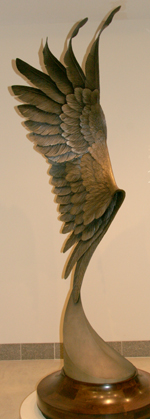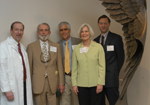Sculpture unveiled at HCC
Hollings
Cancer Center unveiled a sculpture by world-renowned wildlife artist
Grainger McKoy on March 30 to honor the courage in people battling
cancer. To the right of
the sculpture are the words by Emily Dickinson, “Hope is the thing with
feathers that perches in the soul and sings the tune without the words
and never stops at all.”
To the right of
the sculpture are the words by Emily Dickinson, “Hope is the thing with
feathers that perches in the soul and sings the tune without the words
and never stops at all.”The sculpture, Recovery Stroke, was commissioned by Hal S. Currey, Margaret “Peggy” Schachte and the trustees of the Joanna Foundation for the welcome pavilion of the new Hollings Cancer Center facility to inspire and comfort cancer patients during their fight against this insidious disease.
Admirers of McKoy’s art and long-time members of the MUSC community, Schachte and Currey met with McKoy, and together they envisioned a powerful new dimension to an earlier McKoy sculpture. McKoy was inspired by the vision of a monumental wing that would resonate with people experiencing illness or loss.
“There is a point of grace and elegance in a bird’s flight when the wing is at its weakest and most vulnerable—a point of recovery before the next push of a power stroke to soar forward. Recovery is the process of restoration if we are to fly. The beauty of recovery is the acknowledgment of our weakness and preparation for greater strength,” Grainger McKoy said during the unveiling.
 With the Recovery
Stroke sculpture are HCC's Dr. Andrew Kraft, from left, benefactor Hal
S. Currey, artist Grainger McKoy, benefactor Peggy Schachte, and MUSC
President Dr. Ray Greenberg.
With the Recovery
Stroke sculpture are HCC's Dr. Andrew Kraft, from left, benefactor Hal
S. Currey, artist Grainger McKoy, benefactor Peggy Schachte, and MUSC
President Dr. Ray Greenberg. Inspired by the vision of Schachte, Currey, and McKoy, The Joanna Foundation joined in support of this gift. Recovery Stroke matched the foundation’s vision of concern for community and citizenship, as well as the practical philosophy and motivational values of the foundation’s founders, William H. Regnery and Walter Regnery.
McKoy’s sculpture is rarely seen by the public, since his work is nearly always commissioned by private individuals and displayed in their homes. The installation of Recovery Stroke at HCC is the only permanent public display of McKoy’s work in South Carolina.
These contributions were given in memory of Louise Currey Nicholls and Elizabeth Currey Foster, who had cancer, and Ann Regnery Smith, a dedicated Joanna foundation trustee for many decades who lost her battle with cancer in 2001.
“Not only is this a generous contribution from visionary donors, but it also provides a special gift to our cancer patients,” said Hollings Cancer Center director Andrew Kraft, M.D. “While we are proud of the cutting-edge treatment and care that is provided to cancer patients from throughout the state, this sculpture provides a unique inspirational component to care. It is our hope that Recovery Stroke will be a source of inspirational power for cancer patients and their caregivers that will make their struggle a little easier.”
About Grainger McKoy
Grainger McKoy is one of the country’s foremost sculptors. His lifelong devotion to both artistic representation of birds and anatomical precision have inspired people to describe him as a modern-day Audubon.
Born in North Carolina and raised in Sumter, McKoy’s studio for more than 15 years was on Wadmalaw Island where much of his growth as a sculptor took place.
McKoy sculpts only birds, always in wood, capturing the finest detail of each feather. He freezes unseen bursts of energy to allow the viewer to experience the beauty of that fleeting instant. A few years ago, he began casting his original wood sculpture into bronze and sterling silver.
McKoy’s bronze sculpture represents perhaps a purer form of his vision than his wood sculpture. Maintaining the breathtaking complexity of his one-of-a-kind wood originals, each metal sculpture requires individual molds to be made from each wooden feather. The sculpture is then cast using the lost-wax process.
About the Joanna Foundation
The Joanna Foundation was established in 1945 as an eleemosynary corporation in South Carolina with broad charitable purposes, primarily for the benefit of the citizens of Joanna, home of Joanna Cotton Mills Company.
The foundation is “dedicated to community betterment ... promoting the causes of health and education, and other worthwhile improvements.”
The founders included Walter Regnery, president of Joanna Cotton Mills Company, and William H. Regnery, president of the parent company, Joanna Western Mills of Chicago.
In establishing the foundation, the Regnerys developed a bold concept to make it self-renewing and truly responsive to the needs of the Joanna community. The foundation would own the company store, and any profits would fund community improvements. Its governing board, consisting primarily of townspeople, managed the store and set priorities for the foundation.
This concept reflects the Regnery philosophy of good management and good citizenship “to advance, by every possible means, independence, responsibility, and civic pride.”
As an early model of public-private partnership, the Joanna Foundation was the subject of a Harvard Business School case study. Strong interest in higher education, community development, and conservation of natural areas is an enduring legacy from those early days.
The Joanna Foundation reflects the concern for community and citizenship, as well as the practical philosophy and motivational values, of the Regnery founders. The trustees continue to explore opportunities to respond to changing needs by supporting programs that emphasize collaboration and personal involvement by those whom the programs are aimed to benefit.
The Joanna Foundation Board of Trustees include: Walter C. Regnery (president), Eugenie F. Regnery, Patricia L. Regnery, Charles E. Menefee, Jr., Margaret P. Schachte (Executive Vice President), Mary Beth Greenslade, Yonge R. Jones, and Eugenie J. Parker.
Friday, April 6, 2007
Catalyst Online is published weekly,
updated
as needed and improved from time to time by the MUSC Office of Public
Relations
for the faculty, employees and students of the Medical University of
South
Carolina. Catalyst Online editor, Kim Draughn, can be reached at
792-4107
or by email, catalyst@musc.edu. Editorial copy can be submitted to
Catalyst
Online and to The Catalyst in print by fax, 792-6723, or by email to
catalyst@musc.edu. To place an ad in The Catalyst hardcopy, call Island
Publications at 849-1778, ext. 201.